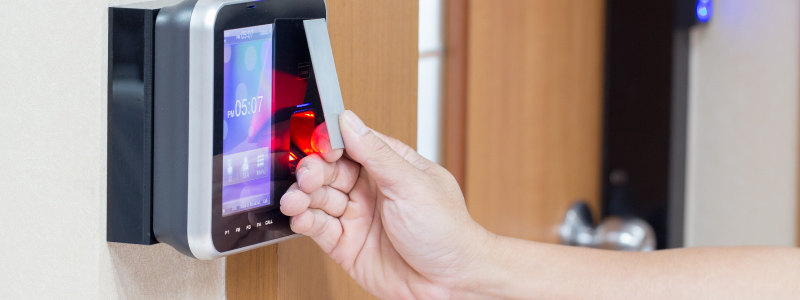Business security devices: Essential protection tools

Amanda Morgan

Business security devices have become an essential investment for organizations of all sizes. As tech progresses, the selection and potential of these systems keep on growing, offering businesses more safety and assurance. In this blog post, we will delve into various types of business security devices that can help safeguard your valuable assets.
We'll begin by discussing surveillance cameras and their importance in monitoring both internal and external environments. Next, we'll explore the benefits and types of burglar alarms that serve as a critical line of defense against unauthorized entry.
Moving forward, you'll learn about access control systems which allow businesses to manage who has permission to enter specific areas within their premises. We will also discuss fire detection systems that play a crucial role in ensuring safety from potential hazards.
Lastly, our focus will be on strategies for integrating these diverse security devices into a comprehensive solution tailored to meet your organization's unique needs.
Surveillance cameras: An overview
To ensure greater security, surveillance cameras are a necessary addition to any business. These tools provide constant observation and documentation of occurrences in the area, allowing for easier identification of potential hazards and implementation of appropriate measures.
Features of surveillance cameras
- High-resolution video: Modern surveillance cameras capture clear images for easy identification.
- Night vision: Infrared technology allows cameras to record footage even in low-light conditions or complete darkness.
- Motion detection: Some models include motion sensors that trigger recording when movement is detected, conserving storage space and focusing on relevant events.
- Pan-tilt-zoom (PTZ) functionality: PTZ cameras allow remote control over the camera's movement, enabling users to focus on specific areas as needed.
The benefits of using surveillance cameras for businesses
Surveillance cameras offer several advantages for businesses, including deterring criminal activity, improving employee productivity, and providing evidence in case of incidents. By strategically installing these devices, you can create a safer environment for employees and customers while protecting valuable assets from theft or damage. Recorded footage can also be used to support insurance claims or legal proceedings if necessary.
Different types of surveillance cameras
Choosing the right type of surveillance camera depends on location requirements and budget constraints. Common types include:
- Dome cameras: Discreet design makes them ideal for indoor use and can be mounted on ceilings or walls.
- Bullet cameras: Cylindrical-shaped devices suitable for outdoor installations and offer long-range viewing capabilities.
- Wireless IP cameras: Versatile options that allow remote access to live footage via smartphones or computers using Wi-Fi connectivity. source
Incorporating surveillance cameras into your business security plan is a smart investment that can help safeguard your property while providing peace of mind.
Burglar alarms: Benefits and types
Protect your business assets, employees, and customers from potential threats with burglar alarms. Burglar alarms can provide a range of advantages, including discouraging criminals, minimizing the danger of burglary or destruction, and bringing comfort to business proprietors.
Types of burglar alarms
Choose from several types of burglar alarms that cater to different needs and budgets:
- Wired alarm systems: Reliable connection without interference issues, but requires professional installation due to complex wiring.
- Wireless alarm systems: Easy-to-install with no extensive wiring, but may be prone to signal interference from other devices.
- Motion detectors: Detect movement within a specific area using infrared technology or microwave radiation, triggering an alarm during unauthorized access attempts.
- Glass break sensors: Detect the sound frequency produced by breaking glass, triggering an alarm if necessary.
Ensure optimal performance of your chosen burglar alarm system by selecting the right security provider, regular maintenance checks, and integrating it with other security measures like surveillance cameras. Choosing the right security provider is crucial to ensure comprehensive protection.
Factors to consider
Consider the size of your property, potential entry points for intruders, and any specific security concerns you may have when choosing a burglar alarm system. This will help ensure that your chosen system meets all of your business's security requirements.

Access control systems: Advantages and options
Access control systems are a must-have for business security. They manage who can enter your premises and when. Access control systems provide a higher level of security, convenience and flexibility compared to lock-and-key methods.
Advantages of access control systems
- Increased security: By restricting access to authorized personnel only, you can significantly reduce the risk of theft or unauthorized entry.
- Audit trail: Many access control systems provide detailed logs of entry attempts and granted accesses, allowing you to monitor activity at your facility closely.
- Fewer lost keys: With electronic access controls in place, there's no need for physical keys that can be lost or stolen - reducing the risk associated with key management.
- Better flexibility: You can easily grant temporary access to visitors or contractors without having to issue them a physical key. Plus, it's simple to revoke access when it's no longer needed.
Different types of access control systems
Selecting the right system depends on your specific needs. Here are some popular options:
- Key card systems: Employees use cards with magnetic strips or RFID chips to unlock doors.
- Biometric systems: This technology relies on unique physiological characteristics, such as fingerprints or facial recognition, to grant access. These systems offer an added layer of security.
- Keypad entry systems: Users enter a code on a keypad to unlock doors. Cost-effective and simple to install, yet not as secure as other choices.
- Smartphone-based access control: These systems allow users to unlock doors using their mobile devices. Kisi offers smartphone-based access control solutions.
Fire detection systems: Features and benefits
Fire detection systems are a must-have for any business. They protect your employees, customers, and assets from the devastating effects of a fire. These systems come in different types with unique features to suit specific needs.
Types of fire detection systems:
- Smoke detectors: Detect smoke particles in the air and sound an alarm when levels reach a certain threshold.
- Heat detectors: Monitor temperature changes within a space and trigger an alarm if temperatures rise rapidly or exceed a predetermined limit.
- Gas detectors: Detectors for hazardous gases, like carbon monoxide, which can result in fires or blasts, are identified by these devices.
- Flame detectors: Recognize ultraviolet or infrared radiation emitted by flames, activating alarms upon detection.
Businesses can also opt for integrated fire detection systems that combine multiple sensors into one comprehensive solution. Some advanced options even offer remote monitoring capabilities through smartphone apps or web-based platforms for added convenience and peace of mind.
Benefits of fire detection systems:
- Provide early warning signs of potential fires, saving lives.
- Enable quick response times, mitigating property damage.
- Potentially reduce insurance premiums due to increased safety measures.
- Comply with local fire codes and regulations, avoiding fines or penalties.
When selecting a fire detection system, consider factors such as the size of your facility, the nature of your operations, and any specific hazards present. Consulting with an experienced fire protection professional can help you make informed decisions about the best solution for your unique needs.
Strategies and solutions for integrating security devices
Integrating security devices into your business's infrastructure is crucial for optimal performance and protection. Here are some strategies and solutions to help you seamlessly incorporate these systems.
Assess your current infrastructure
Evaluate your current setup before integrating new security devices. Conduct a security audit to determine the strengths and weaknesses of your existing system. This process will help identify potential vulnerabilities or areas that require improvement.
Choose compatible devices
Select security devices that are compatible with your existing system to ensure seamless integration with minimal disruptions to daily operations. Research various options such as surveillance cameras, burglar alarms, access control systems, and fire detection systems that are designed to work together within an integrated network.
Centralize management systems
Efficiently monitor all aspects of your business's security from one platform by using a centralized management system. Consider using software like Genetec Security Center, which offers a unified interface for managing multiple security components simultaneously.
Prioritize network security
- Secure Wi-Fi: Implement strong encryption methods on wireless networks to ensure secure connections between all devices.
- Data protection: Use data loss prevention (DLP) tools like Digital Guardian DLP Platform to protect your data.
- Vulnerability scanning: Regularly scan your network for vulnerabilities using tools like Nessus.
Train your staff
Ensure that all personnel are apprised of the accurate operation and upkeep of safety tools. This includes understanding how to respond to alerts and notifications from integrated systems.
FAQs in relation to business security devices
What are the security items in a business?
Surveillance cameras, burglar alarms, access control systems, and fire detection systems are essential security items for businesses to protect assets, employees, and sensitive information from theft or damage.
What is the importance of security system in business?
A security system is crucial for businesses to prevent unauthorized access, protect valuable assets and data, ensure employee safety, and reduce liability risks and insurance costs, ultimately maintaining a positive reputation by demonstrating commitment to safety and security.
What is best security for small business?
The best security solution for small businesses depends on their specific needs, but typically includes surveillance cameras with remote monitoring capabilities, intrusion detection systems like motion sensors, access control measures such as keycards or biometric scanners, and fire alarm systems.
What is the use of security devices?
Security devices serve various purposes, including deterring criminal activity like theft, protecting property/assets against vandalism or damage, controlling authorized personnel's entry into restricted areas within premises, and detecting fires early enough to minimize potential damages/losses.

Conclusion
Protecting your business is crucial, and security devices are a must-have for any business owner.
Surveillance cameras can help you keep an eye on your property and employees, while burglar alarms can alert you of any unauthorized entry.
Access control systems provide an extra layer of protection by restricting access to certain areas, and fire detection systems can save lives in case of a fire.
Integrating these security measures into a cohesive system is key to maximizing their effectiveness and responding quickly in case of an emergency.
Don't leave your business vulnerable - invest in business security devices today.










